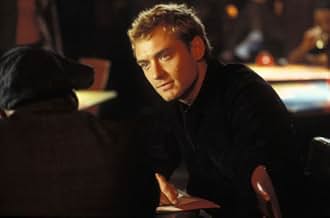NOTE IMDb
6,2/10
56 k
MA NOTE
Un coureur de jupons cockney apprend à ses dépens les dangers de ses actions.Un coureur de jupons cockney apprend à ses dépens les dangers de ses actions.Un coureur de jupons cockney apprend à ses dépens les dangers de ses actions.
- Réalisation
- Scénario
- Casting principal
- Récompenses
- 7 victoires et 8 nominations au total
Renée Taylor
- Lu Schnitman
- (as Renee Taylor)
Avis à la une
The great thing about being dragged to see films that you don't really want to see, is that when they turn out to be OK then you end up leaving the theatre feeling semi satisfied. And that is exactly what this remake of the 60's Michael Caine film is, OK. Caine purists have moaned that the film itself doesn't bear up well against the original, that it isn't as gritty or in some ways, seedy as its predecessor and that anything with Law in it is just style over substance. What we actually get is a poorly directed, shoddily edited, mildly entertaining popcorn flick, which IS style over substance.
Law gives a decent and somewhat infectious performance as lovable, mockney Alfie, further staking his claim towards the best do hair in the world award. There is also decent support from Omar Epps as Alfie's cheated on best mate Marlon and Susan Sarandon looking not a day over 40.
The main problem I found with the film was the blatant over directing and editing of certain scenes, especially those that involved emotion. The scene where Law is dumped by his girlfriend (Marisa Tomei) is a prime example, instead of getting what could have been a moving insight of the mind of our protagonist, we get a scene which is about 5 or 6 takes botched together, which drains any feeling there might have been altogether. Did Shyer have trouble getting actors to act? Should he stick to Steve Martin wedding films?
All in all this is 21st century, times have changed since 1966, women are no longer men's toys like they were back then, peoples attitudes to sex, abortion, and social comment are all different compared with 40 years ago and this is reflected in here.
Alfie isn't bad, it is just OK, and if you are forced into it, then probably all the better for enjoyment purposes. 6/10
Law gives a decent and somewhat infectious performance as lovable, mockney Alfie, further staking his claim towards the best do hair in the world award. There is also decent support from Omar Epps as Alfie's cheated on best mate Marlon and Susan Sarandon looking not a day over 40.
The main problem I found with the film was the blatant over directing and editing of certain scenes, especially those that involved emotion. The scene where Law is dumped by his girlfriend (Marisa Tomei) is a prime example, instead of getting what could have been a moving insight of the mind of our protagonist, we get a scene which is about 5 or 6 takes botched together, which drains any feeling there might have been altogether. Did Shyer have trouble getting actors to act? Should he stick to Steve Martin wedding films?
All in all this is 21st century, times have changed since 1966, women are no longer men's toys like they were back then, peoples attitudes to sex, abortion, and social comment are all different compared with 40 years ago and this is reflected in here.
Alfie isn't bad, it is just OK, and if you are forced into it, then probably all the better for enjoyment purposes. 6/10
What's it all about? (opening line from the original-movie 1966)
"Alfie" is a remake of the 1966 British film that made an international star of Michael Caine. It takes a story very much associated with a particular time and place -- London in the swinging '60s -- and successfully transplants it to modern-day New York City. The cockney lothario played by Caine has been turned into a working-class British émigré played by Jude Law, who makes Alfie a bit less cockney and a bit more self-aware.
Alfie's a smooth talking Londoner in New York who does his very best to avoid succumbing to the dreaded 'c' word commitment. Along the way, we're introduced to some of his ladies on the go Dorie, Julie, Liz and Nikki, to name but a few.
Like the earlier "Alfie," it's the story of a sexually promiscuous man. Alfie (Law), a chauffeur, lives in a small Manhattan apartment and dedicates his life to seducing women. Talking directly into the camera, and preening with a self-satisfaction so complete as to seem a form of innocence, he expounds on clothes, the proper application of cologne and the various rules he employs in his libidinous pursuits. His goal, it seems, is to have sex with as many women as possible but to get close to none of them.
Each one starts off as a fling, but somehow manages to influence Alfie's life. He slowly starts to realize that he is actually alone and that there is more to life than what he has done so far.
Like the earlier "Alfie," the new version could be called a cautionary tale, about a way of life that leads to the existential confusion embodied in the famous catchphrase, "What's it all about?"
Anyone we know in it? Jude Law is fresh and funny as Alfie, with just the right amount of smug attitude. The stunning Sienna Miller is the beautiful but 'damaged' Nikki, and Susan Sarandon sizzles as the sexy older woman, Liz. There's also Marisa Tomei (Julie), Nia Long (Lonette) and Omar Epps plays Alfie's best friend, Marlon.
Would I recommend it? Definitely. Although remakes do not usually come through smelling of roses, this one does. It's fresh, colourful and funny. Jude Law is magnificent, introducing us to a slightly warmer side of Alfie than Michael Caine.
"Alfie" is a remake of the 1966 British film that made an international star of Michael Caine. It takes a story very much associated with a particular time and place -- London in the swinging '60s -- and successfully transplants it to modern-day New York City. The cockney lothario played by Caine has been turned into a working-class British émigré played by Jude Law, who makes Alfie a bit less cockney and a bit more self-aware.
Alfie's a smooth talking Londoner in New York who does his very best to avoid succumbing to the dreaded 'c' word commitment. Along the way, we're introduced to some of his ladies on the go Dorie, Julie, Liz and Nikki, to name but a few.
Like the earlier "Alfie," it's the story of a sexually promiscuous man. Alfie (Law), a chauffeur, lives in a small Manhattan apartment and dedicates his life to seducing women. Talking directly into the camera, and preening with a self-satisfaction so complete as to seem a form of innocence, he expounds on clothes, the proper application of cologne and the various rules he employs in his libidinous pursuits. His goal, it seems, is to have sex with as many women as possible but to get close to none of them.
Each one starts off as a fling, but somehow manages to influence Alfie's life. He slowly starts to realize that he is actually alone and that there is more to life than what he has done so far.
Like the earlier "Alfie," the new version could be called a cautionary tale, about a way of life that leads to the existential confusion embodied in the famous catchphrase, "What's it all about?"
Anyone we know in it? Jude Law is fresh and funny as Alfie, with just the right amount of smug attitude. The stunning Sienna Miller is the beautiful but 'damaged' Nikki, and Susan Sarandon sizzles as the sexy older woman, Liz. There's also Marisa Tomei (Julie), Nia Long (Lonette) and Omar Epps plays Alfie's best friend, Marlon.
Would I recommend it? Definitely. Although remakes do not usually come through smelling of roses, this one does. It's fresh, colourful and funny. Jude Law is magnificent, introducing us to a slightly warmer side of Alfie than Michael Caine.
Not a lot of people know this, but Terence Stamp first played the role of Alfie on stage over thirty years ago. He was then offered the film role, but turned it down. His flatmate, a struggling up and coming actor, tried to convince him to take the part, but Terence was not budging. And so his flatmate took the role. His name, was Michael Caine, and that film, Alfie, spring boarded the young actor to be the most famous cockney in the world. Of all Caine's films this ranks alongside Get Carter and The Italian Job as his best, and so why re-make it I hear you cry! Hollywood had a go at remaking The Italian Job and Get Carter but only came out with turkeys so big you couldn't fit them in your oven. But instead of remaking a Michael Caine film that wasn't good (THE SWARM, BLAME IT ON RIO!) Caine's golden classic Alfie has had the makeover, with pretty boy Jude Law bought in to ask what it's all about. Well for those who don't know what it's all about, Alfie's world is women, pulling them and dumping them. Sounds a little cold, but that is Alfie, a bird puller extraordinaire who lives for the conquests, but soon bores of them whenever commitment rears it's ugly head. Of course Alfie has to be bought down a peg or two, and this happens as a result of another conquest, which has further reaching consequences than Alfie can realize. But should Alfie have been dusted down for the 2004 audience? Well the answer is no. But why? Well, to analyse this we have to go back to the beginning and what Alfie was in Caine's day. Alfie was a man about town stuck in the poor end of London, sleeping his way through a never ending supply of 'birds' while fighting his working class shackles. Back then women were not the powerful sex they are today, at least not on the cinema screen, and were happy to get Alfie's dinner and scrub his floors. Now lets look at Jude Laws Alfie, living in present day New York, and sleeping with a seemingly never ending amount of stunners, who all seem to be getting as much out of him as he gets out of them. And so what's he got to fight against? Not his surroundings (he's in glamorous Manhattan) and his job isn't that bad (still a driver, but look at the perks), and he even likes the kid of one of his girlfriends. And so he's a nice guy, and there is problem 1, bang goes Alfie's cold side. And so what we are left with is a man who lives in New York and finds it hard to commit. Hardly a rare phenomenon. Problem number 2 is the original Alfie movie's use of the shock factor. Denholm Elliott turning up to do a back street abortion was enough to make some walk out the cinema in 1966. In this film the subject of abortion, although delicately handled, has lost it's cinematic impact, which is no doubt due to the three decades that has passed between films. And so we come to problem number 3, the films flaw being that the Alfie of today is simply not as relevant to the Alfie of yesterday. Today we have 'Sex and the City', empowered women, whom one can't help but feel would eat Alfie up alive. Indeed, the film would be more realistic if the lead was a female, although that would send traditionalists (like myself) running up the nearest tree. The makers of this re-make obviously think that illnesses has to be stepped up, and so while Caine's Alfie was given shadows on his lung to make him give pause, Law's Alfie gets a lump on his
erm
'Big Ben' (I hope to God that's not the new word for it) But what about performances? Well, Law as Alfie is fine, giving emotion where its needed, although his performance does not bounce along like Caines did. When Caine spoke to the camera, immediately breaking the fourth wall and bonding with the audience, it was the height of cool, when Law does the same it feels cheesy, and like cheese, it soon starts to grate. Susan Sarandon, as the sexy older woman, certainly fulfils her characters description, while Sienna Miller gives a promising portrayal as a young women who looks like a young Marianne Faithful (circa 1965) minus her Rolling Stone. And so the blame for the films failure cannot be left at its actors doors, nor its director. The film is simply a victim of its time. Alfie belongs in the sixties, when the world (or London at least) was swinging. Right now the only thing swinging is the cinema doors, and that's because I've just left.
Why turn "Alfie" into a chick flick?
Maybe for those who mis-remembered the bright, scabrous, creative original. I'm finding that most reviewers are remembering it incorrectly, whereas I saw it for the first time the weekend before I saw this too-pretty make-over.
Most reviewers remember it as black-and-white, which it wasn't.
Most remember it as reflective of the Swinging '60's of London, but the mise en scene was London at the cusp, as attitudes were just starting to change, so characters were flopping in moral confusion.
Most remember the women as pre-liberation, but their passivity was more complicated; Alfie had an unerring ability to hone in on women with horrificallly low self-esteem, regardless of their marital or economic status.
Michael Caine is such an established actor now, none remember that he was not a conventionally handsome lead to be conquering all these women, let alone that he was a cocky Cockney like the Angry Young Man of the period kitchen sink British dramas.
Few remember just how heartless he was - calling all his conquests "it".
None seem to remember how vividly babies and abortion figure into the plot, a la "Vera Drake."
The new version is confused about all these elements.
The cinematography is beautiful, but has to cover up for the fact that while it supposedly takes place in New York City, it was actually filmed in Manchester, England so is missing atmosphere that's so critical to the same ground that's trod in "Sex and the City;" frequent background mattes of the Brooklyn Bridge are weak atmosphere-builders . And this is also some sort of retro NYC that allows smoking in bars and doesn't require helmets on mopeds, which is also a retro means of individual transport.
The film probably takes place in the '00's - but the flashy split screens and the women's make-up and styles are retro-'60's. "Keen Eddie"'s Sienna Miller is made up as a duplicate of the original's Jane Asher. Marisa Tomei even has her hair in a flip with a wide head band and Nia Long is made up like "Cleopatra Jones" from the early '70's.
At least one time we do get a glimpse of a condom package, but that's only obvious now because films today show them, not that they weren't used in the '60's; it does take place in post Roe v. Wade NYC.
The women's personality upgrades are inconsistently effective and there's no drama to how the incredibly beautiful, posh-sounding Jude Law captures them.
Susan Sarandon's self-assured, independent entrepreneur is a sexy, believable update of Shelley Winters' rich widow, making her closing dig at Alfie as a gigolo even more devastating.
Miller's character is now trendily manic depressive, or some such chemically-dependent disorder, rather than just an insecure runaway, which weakens Alfie's hold on her; that character's passive aggressive manipulation of him and how she bypasses him to straighten out her life are missing completely, so we lose some insight into both his cruelty and comeuppance.
Long's character's crisis is weakened from the original's, as her pregnancy conflates two different affairs, with the emphasis instead put on male friendship betrayal, the friend that this "Alfie" claims in passing calls his women "it".
"Alfie"'s health scare had to be updated from TB, and the cancer testing is done for laughs; the lack of mention of Viagra is odd if it is in fact taking place now. Here the older male confidante is stuck in deus ex machina, rather than in plot context.
While the original stands up 35 years later as a mordant and brilliant, matter of fact presentation of "moral lapses," the mild update is considerably weakened and Hollywoodized as respectable company, such that the finale doesn't even segue smoothly into the first musical line of "What's it all about?"
The soundtrack selections are otherwise excellent, but as confusingly retro as the rest of the atmosphere, with neo-soul teen Joss Stone singing and Mick Jagger collaborating with Dave Stewart on originals that sound old.
Maybe for those who mis-remembered the bright, scabrous, creative original. I'm finding that most reviewers are remembering it incorrectly, whereas I saw it for the first time the weekend before I saw this too-pretty make-over.
Most reviewers remember it as black-and-white, which it wasn't.
Most remember it as reflective of the Swinging '60's of London, but the mise en scene was London at the cusp, as attitudes were just starting to change, so characters were flopping in moral confusion.
Most remember the women as pre-liberation, but their passivity was more complicated; Alfie had an unerring ability to hone in on women with horrificallly low self-esteem, regardless of their marital or economic status.
Michael Caine is such an established actor now, none remember that he was not a conventionally handsome lead to be conquering all these women, let alone that he was a cocky Cockney like the Angry Young Man of the period kitchen sink British dramas.
Few remember just how heartless he was - calling all his conquests "it".
None seem to remember how vividly babies and abortion figure into the plot, a la "Vera Drake."
The new version is confused about all these elements.
The cinematography is beautiful, but has to cover up for the fact that while it supposedly takes place in New York City, it was actually filmed in Manchester, England so is missing atmosphere that's so critical to the same ground that's trod in "Sex and the City;" frequent background mattes of the Brooklyn Bridge are weak atmosphere-builders . And this is also some sort of retro NYC that allows smoking in bars and doesn't require helmets on mopeds, which is also a retro means of individual transport.
The film probably takes place in the '00's - but the flashy split screens and the women's make-up and styles are retro-'60's. "Keen Eddie"'s Sienna Miller is made up as a duplicate of the original's Jane Asher. Marisa Tomei even has her hair in a flip with a wide head band and Nia Long is made up like "Cleopatra Jones" from the early '70's.
At least one time we do get a glimpse of a condom package, but that's only obvious now because films today show them, not that they weren't used in the '60's; it does take place in post Roe v. Wade NYC.
The women's personality upgrades are inconsistently effective and there's no drama to how the incredibly beautiful, posh-sounding Jude Law captures them.
Susan Sarandon's self-assured, independent entrepreneur is a sexy, believable update of Shelley Winters' rich widow, making her closing dig at Alfie as a gigolo even more devastating.
Miller's character is now trendily manic depressive, or some such chemically-dependent disorder, rather than just an insecure runaway, which weakens Alfie's hold on her; that character's passive aggressive manipulation of him and how she bypasses him to straighten out her life are missing completely, so we lose some insight into both his cruelty and comeuppance.
Long's character's crisis is weakened from the original's, as her pregnancy conflates two different affairs, with the emphasis instead put on male friendship betrayal, the friend that this "Alfie" claims in passing calls his women "it".
"Alfie"'s health scare had to be updated from TB, and the cancer testing is done for laughs; the lack of mention of Viagra is odd if it is in fact taking place now. Here the older male confidante is stuck in deus ex machina, rather than in plot context.
While the original stands up 35 years later as a mordant and brilliant, matter of fact presentation of "moral lapses," the mild update is considerably weakened and Hollywoodized as respectable company, such that the finale doesn't even segue smoothly into the first musical line of "What's it all about?"
The soundtrack selections are otherwise excellent, but as confusingly retro as the rest of the atmosphere, with neo-soul teen Joss Stone singing and Mick Jagger collaborating with Dave Stewart on originals that sound old.
The tagline for the new film 'Alfie' ask us, what's it all about? The answer, unfortunately, is that it's about sheer disappointment.
The film focuses solely on Alfie Elkins, a swinging young womanizer packed with style and a charm that could only be British. After an all too brief introduction to our protagonist and his long list of lady-friends, some kind of plot begins to develop sort of. We move through far too many completely unrelated situations, all of which only have any relevance at all because of their connection to our main character.
The film does almost nothing to stay focused on a character or situation long enough to develop anything genuine; one minute we have the beginnings of a story with one girl, the next minute we're on to something completely different. You may hope that the film returns to these unfinished story arcs, but it rarely does. And those special times when the story comes back to something that was left unfinished, the film manages to once again leave the story too quickly, adding further loose ends and unresolved issues.
This episodic structure does give the film a pace that is representational of Alfie's dating life constantly moving from one thing to another, never letting anything unfold but this does not work to the advantage of the film. Rather than giving it an interesting structure that parallels the story, it creates confusion and disorientation, and even worse than that a loss of the empathy for the characters that would be present if the film took the time to develop characters and stories properly.
In fact, just about everything in the film lacks conviction, particularly in the places where it is needed the most; moments that should provoke emotion tend to leave the audience wanting something more substantial, which once again is an issue with the film's poor use of development.
If it weren't for Jude Law's charming performance as Alfie Elkins, the film would collapse entirely under its own poor craft. Of course, this is not at all to say that Law saves the film; he does nothing of the sort. His performance, strong as always, just happens to stop the film from being a complete waste of time. His energy is strong and his talent is clear, but it is not enough to bring the film to that next level of quality.
The photography and cinematography, while positively beautiful at times, is staggeringly inconsistent and often not at all fitting to the film's needs. Portions of the film are very nicely photographed, which almost seems like a waste of talent. A spiffy paint job on a car may be appealing to the eye, but why even bother if the car doesn't have an engine? This is precisely what Alfie is all about: some nice looks and a fairly strong performance, but sadly there is no engine to be found.
The film focuses solely on Alfie Elkins, a swinging young womanizer packed with style and a charm that could only be British. After an all too brief introduction to our protagonist and his long list of lady-friends, some kind of plot begins to develop sort of. We move through far too many completely unrelated situations, all of which only have any relevance at all because of their connection to our main character.
The film does almost nothing to stay focused on a character or situation long enough to develop anything genuine; one minute we have the beginnings of a story with one girl, the next minute we're on to something completely different. You may hope that the film returns to these unfinished story arcs, but it rarely does. And those special times when the story comes back to something that was left unfinished, the film manages to once again leave the story too quickly, adding further loose ends and unresolved issues.
This episodic structure does give the film a pace that is representational of Alfie's dating life constantly moving from one thing to another, never letting anything unfold but this does not work to the advantage of the film. Rather than giving it an interesting structure that parallels the story, it creates confusion and disorientation, and even worse than that a loss of the empathy for the characters that would be present if the film took the time to develop characters and stories properly.
In fact, just about everything in the film lacks conviction, particularly in the places where it is needed the most; moments that should provoke emotion tend to leave the audience wanting something more substantial, which once again is an issue with the film's poor use of development.
If it weren't for Jude Law's charming performance as Alfie Elkins, the film would collapse entirely under its own poor craft. Of course, this is not at all to say that Law saves the film; he does nothing of the sort. His performance, strong as always, just happens to stop the film from being a complete waste of time. His energy is strong and his talent is clear, but it is not enough to bring the film to that next level of quality.
The photography and cinematography, while positively beautiful at times, is staggeringly inconsistent and often not at all fitting to the film's needs. Portions of the film are very nicely photographed, which almost seems like a waste of talent. A spiffy paint job on a car may be appealing to the eye, but why even bother if the car doesn't have an engine? This is precisely what Alfie is all about: some nice looks and a fairly strong performance, but sadly there is no engine to be found.
Le saviez-vous
- AnecdotesSusan Sarandon gave pictures of herself in the 1970s to British artist Russell Oxley, who used them to paint an acrylic portrait of her character, supposedly from that era. After filming, the canvas went home with Sarandon.
- GaffesRight after the flower shop scene, Alfie rides his scooter to Liz's place. Only the flowers are not in the basket or anywhere on the scooter. Yet as he comes around the corner of the stairs towards the apartment, he has the flowers in his hand.
- Citations
[last lines]
Alfie: What have I got? Really? Some money in my pocket. Some nice threads, fancy car at my disposal, and I'm single. Yeah... unattached, free as a bird... I don't depend on nobody. Nobody depends on me. My life's my own. But I don't have peace of mind. And if you don't have that, you've got nothing. So... So what's the answer? That's what I keep asking myself. What's it all about? You know what I mean?
- Crédits fousThe producers wish to thank residents and businesses of Northern Quarter Manchester
- Bandes originalesAlfie
Written by Burt Bacharach & Hal David
Performed by Joss Stone
Produced by David A. Stewart (as Dave Stewart) & Mick Jagger
Joss Stone performs courtesy of S-Curve Records/EMI Music North America
Meilleurs choix
Connectez-vous pour évaluer et suivre la liste de favoris afin de recevoir des recommandations personnalisées
- How long is Alfie?Alimenté par Alexa
Détails
Box-office
- Budget
- 60 000 000 $US (estimé)
- Montant brut aux États-Unis et au Canada
- 13 399 812 $US
- Week-end de sortie aux États-Unis et au Canada
- 6 218 335 $US
- 7 nov. 2004
- Montant brut mondial
- 35 060 882 $US
Contribuer à cette page
Suggérer une modification ou ajouter du contenu manquant





































